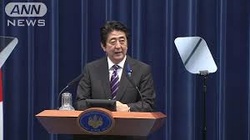 Source: aatv.co.jp
Source: aatv.co.jp This point was raised very eloquently and forcefully by Jeff Kingston of Temple University last week, who wrote that in re-interpreting the Constitution, Abe was circumventing the entire Constitutional amendment process, which itself is odd given that the government has a majority in both Houses of the Diet. In Kingston’s view, Abe knew that the government could never convince the Japanese population to endorse a change in the wording to Article 9 or the inclusion of an additional article permitting the exercise of collective self-defence, and so appointed a committee to re-interpret the Constitution in a manner consistent with the Abe government’s position.
The speed at which the committee’s recommendations were adopted, consensus reached within the LDP/New Komeito coalition, and legislation presented to a pro-rouged session of the Diet for approval has outraged middle and leftist parties and raised doubts about the Abe government’s commitment to the Constitution, even among regional branches of the LDP. The self-immolation of a protestor in Shinjuku wasn’t enough to persuade the government to re-consider its actions, neither were the protests that took place outside the PM’s residence over Monday and Tuesday (reminiscent of those that accompanied the decision to re-start nuclear power plants across the nation last year).
Concern over the Abe government’s haste has certainly affected support levels for Constitutional re-interpretation, as demonstrated by the following results for polls conducted over the past week. The Mainichi Shimbun’s own poll indicated that opposition was running at 58%, while the Nikkei Shimbun recorded opposition at 50% (the likelihood of polls being manipulated to reflect editorial positions has arisen in the Japanese media before, as this particular article from the Asahi Shimbun claims. It would be no surprise if this were the case in this instance, given the level of media attention to the question of Constitutional re-interpretation. It does appear, though, that opposition to the government’s move is greater than any support, a fact that PM Abe himself has acknowledged in the past few months.)
Abe has again adapted the policy of “crash or crash through” on this occasion, and with the Diet numbers to support him, re-interpretation is a fait accompli. In this sense, he is imitating the actions of his grandfather, Kishi Nobusuke, who in 1960 brought about the re-confirmation of the US-Japan Security Treaty against a backdrop of widespread opposition to the move (PDF). As this blog has already noted, Abe has a strong desire to emulate his grandfather, quite possibly believing himself to be the latest member of a political dynasty that has played an historic role in shaping the fate of the nation. It may be that Abe believes that his re-interpretation move has cemented his place in history, and that other issues will occupy his time.
The move has already been welcomed by the US, where the belief has been that it was about time Japan got around to loosening its devotion to its Constitution, the same Constitution that the US helped to draft in the aftermath of the Second World War. With the region still concerned about China, the US expects that its ‘friends and allies’ will move to pick up the slack created by a diminished US defence budget. Japan, for its part, is doing its bit, while also signalling that it will not remain a bystander to any deterioration in the security environment in the Asia-Pacific. Although PM Abe stressed in his press conference that “nothing would really change” following the re-interpretation, it does mean that should the JSF be dispatched to a regional humanitarian disaster or operation and the troops of an allied or partner nation come under attack, then the JSF would be authorised to use force to protect those allies.
Quite possibly this means that the SDF might need to be renamed, taking the title Japan Defence Force to reflect its new reality. After nearly 70 years of non-involvement in military operations abroad, Japan’s forces are about to enter a new age of activity, some of which will cause Japanese voters to question Japan’s participation. Mind you, if one government can interpret the constitution in a certain way, that does leave open the possibility that future governments will choose to revert to the previous interpretation thereby overturning the Abe government’s decision. As long as the text to the Constitution itself remains unaltered, interpretation of that text is an infinite process but one with no permanent solution. What it does do, however, is undermine the legality of the Constitution. Rather than having bipartisan agreement on what the Constitution stands for and its wording, any future government will be able to interpret the Constitution in whatever way it chooses without actually having to re-write it.
This much is true – we have not seen the end of constitutional re-interpretation, and that may cause further political friction (both domestic and foreign) in the future.
 RSS Feed
RSS Feed